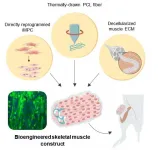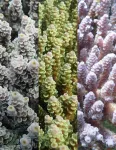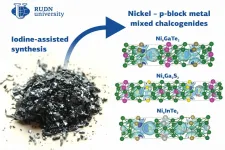A new study suggests that a particular mix of personality traits and unconscious cognition - the ways our brains take in basic information - is a strong predictor for extremist views across a range of beliefs, including nationalism and religious fervour.
These mental characteristics include poorer working memory and slower "perceptual strategies" - the unconscious processing of changing stimuli, such as shape and colour - as well as tendencies towards impulsivity and sensation seeking.
This combination of cognitive and emotional attributes predicts the endorsement of violence in support of a person's ideological "group", according to findings published today in Philosophical Transactions of the Royal Society B.
The study also maps the psychological signatures that underpin fierce political conservatism, as well as "dogmatism": people who have a fixed worldview and are resistant to evidence.
Psychologists found that conservatism is linked to cognitive "caution": slow-and-accurate unconscious decision-making, compared to the fast-and-imprecise "perceptual strategies" found in more liberal minds.
Brains of more dogmatic people are slower to process perceptual evidence, but they are more impulsive personality-wise. The mental signature for extremism across the board is a blend of conservative and dogmatic psychologies.
Researchers from the University of Cambridge say that, while still in early stages, this research could help to better identify and support people most vulnerable to radicalisation across the political and religious spectrum.
Approaches to radicalisation policy mainly rely on basic demographic information such as age, race and gender. By adding cognitive and personality assessments, the psychologists created a statistical model that is between four and fifteen times more powerful at predicting ideological worldviews than demographics alone.
"I'm interested in the role that hidden cognitive functions play in sculpting ideological thinking," said Dr Leor Zmigrod, lead author from Cambridge's Department of Psychology.
"Many people will know those in their communities who have become radicalised or adopted increasingly extreme political views, whether on the left or right. We want to know why particular individuals are more susceptible."
"By examining 'hot' emotional cognition alongside the 'cold' unconscious cognition of basic information processing we can see a psychological signature for those at risk of engaging with an ideology in an extreme way," Zmigrod said.
"Subtle difficulties with complex mental processing may subconsciously push people towards extreme doctrines that provide clearer, more defined explanations of the world, making them susceptible to toxic forms of dogmatic and authoritarian ideologies."
The research is published as part of a special issue of the Royal Society journal dedicated to "the political brain" compiled and co-edited by Zmigrod.
It is the latest in a series of studies by Zmigrod investigating the relationship between ideology and cognition. She has previously published findings on links between cognitive "inflexibility" and religious extremism, willingness to self-sacrifice for a cause, and a vote for Brexit.
A 2019 study by Zmigrod showed that this cognitive inflexibility is found in those with extreme attitudes on both the far right and far left of the political divide.
The latest research builds on work from Stanford University in which hundreds of study participants performed 37 different cognitive tasks and took 22 different personality surveys in 2016 and 2017.
Zmigrod and colleagues, including Cambridge psychologist Professor Trevor Robbins, conducted a series of follow-up tests in 2018 on 334 of the original participants, using a further 16 surveys to determine attitudes and strength of feeling towards various ideologies.
Political conservatism and nationalism was related to "caution" in unconscious decision-making, as well as "temporal discounting" - when rewards are seen to lose value if delayed - and slightly reduced strategic information processing in the cognitive domain.
Personality traits for conservatism and nationalism included greater goal-directedness, impulsivity and reward sensitivity, and reduced social risk-taking. Demographics alone had a predictive power of less than 8% for these ideologies, but adding the psychological signature boosted it to 32.5%.
Dogmatism was linked to reduced speed of perceptual "evidence accumulation", and reduced social risk-taking and agreeableness but heightened impulsivity and ethical risk-taking in the personality domain. Religiosity was cognitively similar to conservatism, but with higher levels of agreeableness and "risk perception".
Adding the psychological signatures to demographics increased the predictive power for dogmatism from 1.53% to 23.6%, and religiosity from 2.9% to 23.4%.
Across all ideologies investigated by the researchers, people who endorsed "extreme pro-group action", including ideologically-motivated violence against others, had a surprisingly consistent psychological profile.
The extremist mind - a mixture of conservative and dogmatic psychological signatures - is cognitively cautious, slower at perceptual processing and has a weaker working memory. This is combined with impulsive personality traits that seek sensation and risky experiences.
Added Zmigrod: "There appear to be hidden similarities in the minds of those most willing to take extreme measures to support their ideological doctrines. Understanding this could help us to support those individuals vulnerable to extremism, and foster social understanding across ideological divides."
INFORMATION:
NOTES:
Study participants were all from the United States, 49.4% were female, and ages ranged from 22-63.
Part of the study used tests of "executive functions" that help us to plan, organise and execute tasks e.g. restacking coloured disks to match guidelines, and keeping a series of categorised words in mind as new ones are added.
Additionally, results from various rapid decision-making tests - switching between visual stimuli based on evolving instructions, for example - were fed into computational models, allowing analyses of small differences in perceptual processing.
Researchers took the results of the in-depth, self-reported personality tests and boiled them down to 12 key factors ranging from goal-directedness and emotional control to financial risk-taking.
The examination of social and political attitudes took in a host of ideological positions including patriotism, religiosity and levels of authoritarianism on the left and right.
The Cambridge team used data modeling techniques such as Bayesian analyses to extract correlations. They then measured the extent to which blends of cognition and personality could help predict ideological attitudes.





